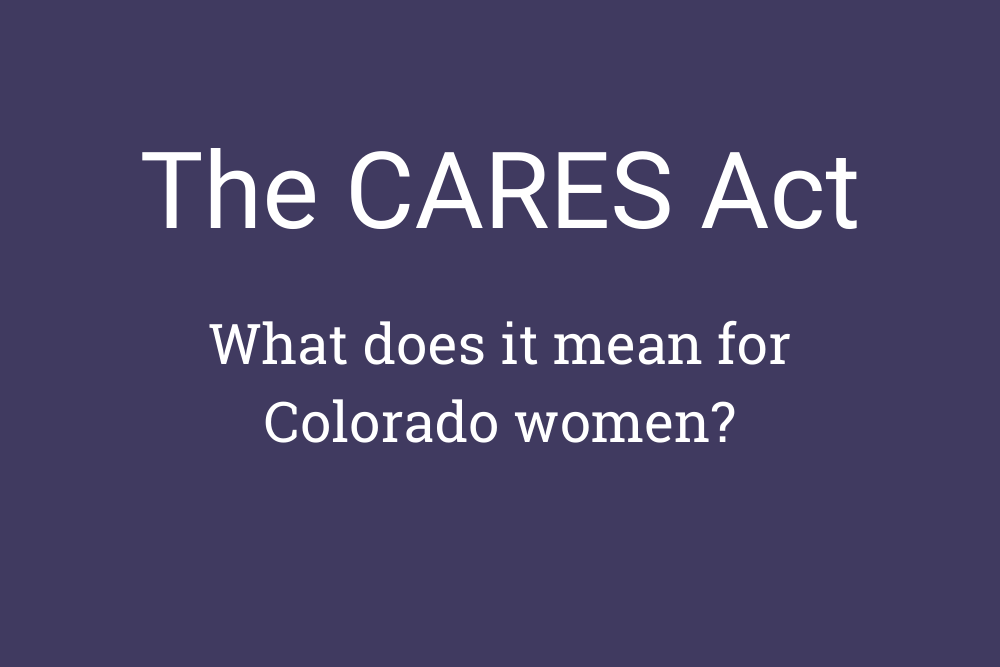
Guest Blog: Breaking Down the CARES Act
What the CARES Act Means for You

Awareness is growing that the COVID-19 pandemic is a gender, race, and class issue. Women make up more than 60 percent of minimum wage workers, are more likely to be single parents, and are more likely to take on unpaid caretaking roles. Additionally, they comprise most of the healthcare workers and child care workforce who are on the frontlines of this public health crisis. So what does the CARES Act mean for these individuals?
The passage of The Coronavirus Aid, Relief, and Economic Security (CARES) Act will provide some respite to them. In fact, the $2 trillion dollar economic stimulus package will benefit 90 percent of Americans. There is much to this stimulus package, so in this article I will cover what is available to individuals and retirees who are financially impacted due to the coronavirus pandemic.
Direct payments – who qualifies?
Individuals (including retirees) with incomes at $75,000 or below will receive payments of $1,200. For those who file as head of household, the limit is increased to $112,500. For couples the total income number is $150,000 and the payment is $2,400. Keep in mind this is adjusted gross income so it may not be your actual salary. There are phaseouts for people who have incomes above these levels. Additionally, there is a $500 payment for each child under the age of 17.
How does it work?
The payment assessment is based on either your 2018, 2019, or 2020 tax return.
- If you qualify based on your 2018 income and have not filed your 2019 income, you have until July 15th to file your taxes. Even if your 2019 income is higher, you will not need to give the money back.
- If you qualify based on your 2019 income, but not your 2018 income, you should file your taxes as soon as possible. You will receive the benefit regardless, but if you can file before the payments are calculated, you will receive it when the payments go out this next quarter, likely May. Otherwise you will receive it back next year.
- If you only qualify for 2020, you will still receive the payment, but when you file your 2020 taxes next year. It will come in the form of a refundable tax credit. It goes without saying that no one should submit a false tax return to try and qualify as this is considered fraud.
Please note that payments will be sent via direct deposit if you have previously had these instructions on file with the IRS. If not, a check will be mailed to the address of record. If you have moved, please act now to update your address with the IRS as mail from the IRS is not forwarded. This IRS link has instructions on how to do this. For people currently receiving Social Security, the payments will go to the same place you receive social security.
Unemployment benefits
Industries that have been hardest hit, e.g. travel and hospitality, employ more women. More women will lose their jobs during the COVID-19 pandemic. For those who have lost their jobs, there is a large increase in unemployment payments for four months. Currently the average weekly state unemployment payment is approximately $385. The stimulus package increases this by $600 a week.
Additionally, they have created a new category of unemployment to cover people who are not traditionally covered by unemployment such as independent contractors, freelancers, and others who cannot find work because of the social distancing measures put in place as a result of the coronavirus pandemic. Also note that there are great incentives for businesses to keep people employed so if you or a loved one has been laid off, there is a chance you may be rehired due to new business incentives to retain employees. Additionally, there are provisions to extend unemployment benefits.
Join a Zoom call for WFCO community members about the CARES Act on Tuesday, April 7th at 2:00 p.m. MT. There will be an opportunity to ask questions.
Student loan deferral
According to the American Association of University Women, women hold nearly two-thirds of the outstanding student debt in the United States — almost $929 billion as of early-2019. AAUW’s 2019 report “Deeper in Debt” explains that because of the gender pay gap, women also take longer — and struggle more — to pay it off. The problem is even worse for women of color.
As part of the stimulus package, federal student loan payments are deferred without interest for six months. You have to reach out and contact your servicer to take advantage of this option. This applies even if you trying to qualify for student loan forgiveness and is in fact, even more important in that situation as it essentially forgives an additional six months of payments.
Utilizing employer sponsored plans for cash needs
There are also provisions to be able to take distributions of up to $100,000 out of employer sponsored retirement plans or IRAs and you have the ability to split the taxation out over three years given withdrawals from traditional pre-tax money is taxed like ordinary income. If your income will be low for 2020 you can also opt to have it all taxed in 2020 at your lower income tax rate. These are the only two options. You will not pay a 10 percent penalty on these withdrawals. There is also no mandatory withholding so the first year’s tax will not be due until you file your 2020 taxes.
Alternatively, which may be a better option to preserve retirement funds for retirement, you could borrow from your employer sponsored plan. The maximum loan amount is increased to the lesser of $100,000 or 100 percent of your vested balance. Payments on these loans may be delayed for one year.
For retirees
For individuals who are also retirees or who have inherited a retirement account, required minimum distributions for 2020 are suspended. If you have already taken your RMD and it has been less than 60 days, you can do a 60 day rollover to move the funds back into your account. Please note that if you withheld taxes there is no way to get those funds back so you will need to make up the difference to get the full amount rolled back into your account. The taxes withheld will count towards your 2020 tax withholding, however. This option does not apply to inherited IRAs.
This suspended RMD year may present an opportunity to do a ROTH conversion or partial ROTH conversion. Each situation is individual so please speak with your tax or financial advisor to see if it applies to your individual situation.
Small businesses and sectors in need
This stimulus package can only take care of your financial needs, but hopefully it eases the burden. Additionally, it will bolster small businesses and sectors in need, such as early care and education (ECE). In fact, The Women’s Foundation of Colorado signed on to a letter to Congress urging members to support the industry that is the backbone of our economy. Colorado will receive about $41 million for ECE support.
Join a Zoom call to learn more about the CARES Act
I will host a Zoom call about the CARES Act for WFCO community members on Tuesday, April 7th, at 2:00 p.m. MDT. Please join us; there will be an opportunity to ask questions.
Stephanie Bruno served as WFCO’s board chair from 2018-2020. She owns Sea to Peak Financial Advisors where she helps executives bring meaning to their money.

